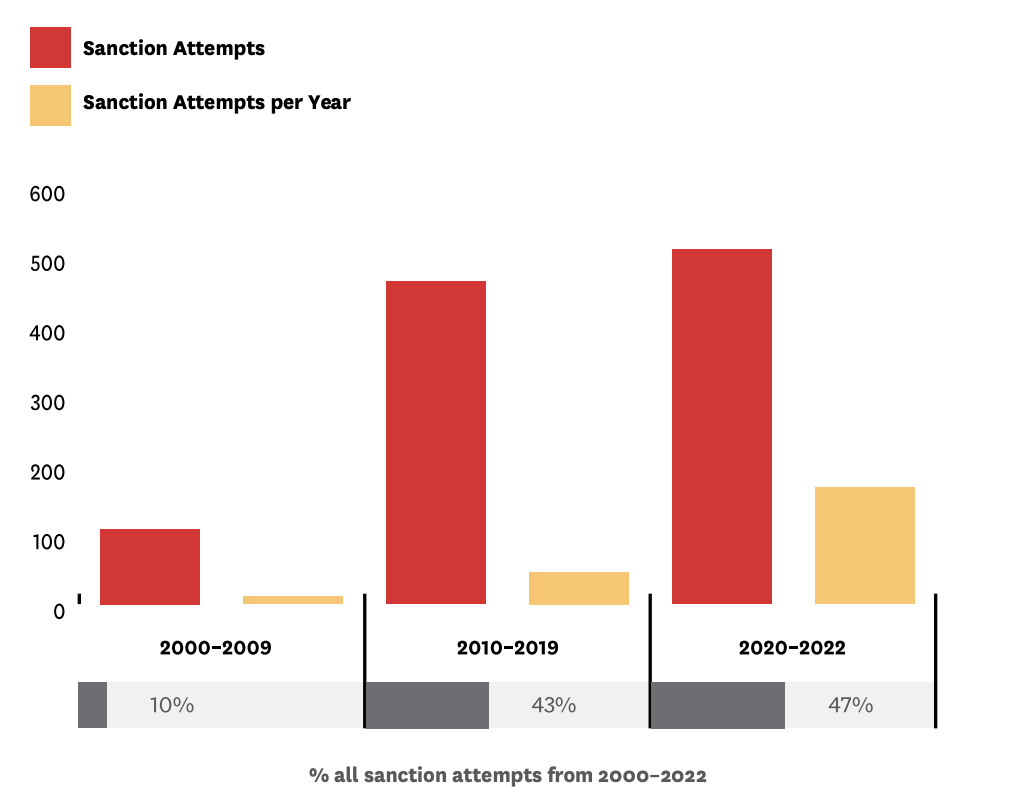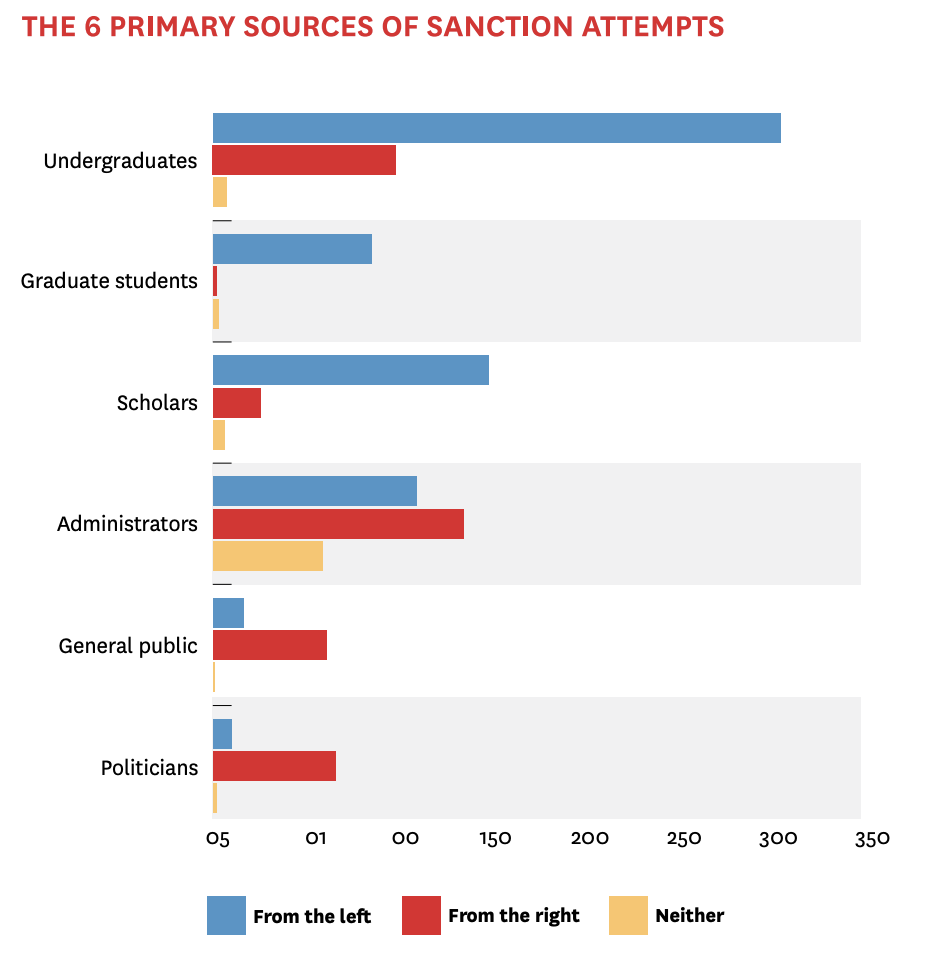Attempts to sanction academics for their speech have soared over the last three years, a new report has found. Research by FIRE (Foundation for Individual Rights and Expression) shows that the number of college and university scholars subjected to attempted punishment in the past three years (509) almost matches the corresponding number for the 20 years prior to 2020 (571).
The astronomical rise coincides with Donald Trump’s election and the #MeToo movement, which sparked a surge in sanction attempts. Between 2017-2019, there were 252 sanction attempts, compared to a total of 319 over the previous 17 years. But these figures are dwarfed by what the report describes as a “tsunami of sanction attempts” shortly after George Floyd’s murder in 2020. In 2020 alone there were 151 sanction attempts, with 87 occurring in response to race-related expression (58%).

A sanction attempt constitutes anything from open letters and petitions to outright termination of employment. Its targets are varied, but among the most prominent are the humanities disciplines (402 attempts) and white and/or male scholars. Nearly four-fifths (845) of sanction attempts involved white scholars (78%), compared to 92 involving black scholars (9%), the next highest group.
Recent examples of sanction attempts include Tabia Lee, the faculty director of De Anza College’s Office of Equity, Social Justice and Multicultural Education, who reported that her contract was not being renewed after she questioned her institution’s “orthodoxy” on DEI. Elsewhere, Harvard’s Kenneth Roth was denied fellowship over tweets which were critical of Israel — a decision for which the university later apologised.
While those initiating the sanction attempts largely come from the Left within institutions, a growing number have been coming from the Right outside of it. The graph below shows the pace at which Government officials from the Right have started sanction attempts: in the last three years, there have been 39, already comfortably ahead of the previous decade’s total.

The issue over which most scholars face sanction attempts is race. In total, from 2000 to 2022, 426 sanction attempts, including 64 employment terminations, involved scholars talking about issues such as racial inequality and the Black Lives Matter movement. This also includes quoting from or assigning texts containing racial slurs (for example, works by James Baldwin and Martin Luther King Jr.) (39%).
The universities where most sanction attempts have occurred are typically the most gilded. Leading the pack was Harvard (23) — which also topped the chart for the highest number of successful sanctions — followed by Stanford (22), UCLA (19), and Georgetown (16). Overall, 90 of the top 100 universities in the US have had at least one sanction attempt since 2000.
“Cancel culture is particularly pernicious when it targets people charged with discovering and disseminating knowledge,” said FIRE Director Komi Frey. “Vocal, dogmatic minorities on the left and the right are trying to restrict the range of acceptable ideas in institutions of higher education, and this should alarm us all. You do not need to agree with a scholar’s teaching, research, or extramural speech to recognize that censorship is not the answer.”








Join the discussion
Join like minded readers that support our journalism by becoming a paid subscriber
To join the discussion in the comments, become a paid subscriber.
Join like minded readers that support our journalism, read unlimited articles and enjoy other subscriber-only benefits.
Subscribe“The universities where most sanction attempts have occurred are typically the most gilded.”
Possibly not unrelated to them being the places where there is the highest incentive to knock someone out to grab their place and climb higher up the academic greasey pole.
“The universities where most sanction attempts have occurred are typically the most gilded.”
Possibly not unrelated to them being the places where there is the highest incentive to knock someone out to grab their place and climb higher up the academic greasey pole.
The most gilded universities contain the most attractive ‘trophies’ for the activists to claim.
The most gilded universities contain the most attractive ‘trophies’ for the activists to claim.
Wouldn’t it be better to publish the flood of statistics as a footnote or link and use the article to explore the topic in more depth? Just a thought.
Or even more importantly, define the bl00dy terms. Odd the numbers define the sources, but not the type of sanction.
Or even more importantly, define the bl00dy terms. Odd the numbers define the sources, but not the type of sanction.
Wouldn’t it be better to publish the flood of statistics as a footnote or link and use the article to explore the topic in more depth? Just a thought.
In the student totals, I’m curious how the initiators break out by gender, race, orientation, etc. who is actually on the offensive here, and do they represent a ground swell or just their own self-assertive voices?
In the student totals, I’m curious how the initiators break out by gender, race, orientation, etc. who is actually on the offensive here, and do they represent a ground swell or just their own self-assertive voices?
The case of Kenneth Roth is hardly illustrative. Roth isn’t an academic, and he presided over the ideological and financial corruption of a onetime human rights stalwart.
As a poster below noted, it’s at best misleading to say that Roth posted tweets “critical of Israel” when his organization’s mission was to delegitimize Israel among cultural elites in the UK and the US (under the guise of promoting human rights, of course).
Am I saying he shouldn’t have been offered a fellowship at Harvard? No. But his case should prompt conversation about what, if anything, might ever be disqualifying. It should not be used as a notable example of “attempts to sanction academics.”
The case of Kenneth Roth is hardly illustrative. Roth isn’t an academic, and he presided over the ideological and financial corruption of a onetime human rights stalwart.
As a poster below noted, it’s at best misleading to say that Roth posted tweets “critical of Israel” when his organization’s mission was to delegitimize Israel among cultural elites in the UK and the US (under the guise of promoting human rights, of course).
Am I saying he shouldn’t have been offered a fellowship at Harvard? No. But his case should prompt conversation about what, if anything, might ever be disqualifying. It should not be used as a notable example of “attempts to sanction academics.”
This could have been a really interesting piece. But with the definition of sanction as ‘anything from open letters and petitions to outright termination of employment’, it’s dead loss. Like Tell Mama’s defining ‘racist attacks’ as anything from looking at someone the wrong way to stabbing them. It’s infuriating because this is an important issue, and the definition as stands is quite literally meaningless.
This could have been a really interesting piece. But with the definition of sanction as ‘anything from open letters and petitions to outright termination of employment’, it’s dead loss. Like Tell Mama’s defining ‘racist attacks’ as anything from looking at someone the wrong way to stabbing them. It’s infuriating because this is an important issue, and the definition as stands is quite literally meaningless.
Kenneth Roth is not a critic of Israel. He is a sworn enemy who persistently and obsessively lies and defames Israel and its people and misrepresents their character and laws. The former head of Human Rights Watch, he was severely taken to task for his false accusations against the country by the organization’s founder, in particular his assertion that Israel is an apartheid state. Harvard should never have offered him a fellowship.
Kenneth Roth is not a critic of Israel. He is a sworn enemy who persistently and obsessively lies and defames Israel and its people and misrepresents their character and laws. The former head of Human Rights Watch, he was severely taken to task for his false accusations against the country by the organization’s founder, in particular his assertion that Israel is an apartheid state. Harvard should never have offered him a fellowship.
And the left say there is no culture war…
And the left say there is no culture war…